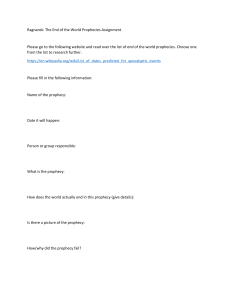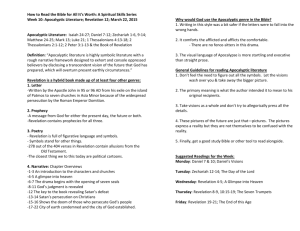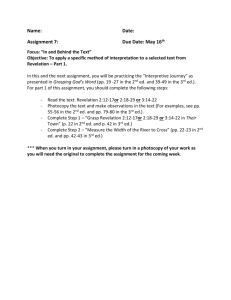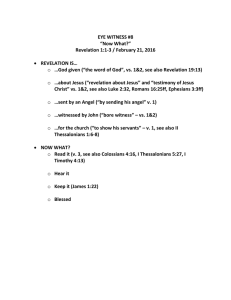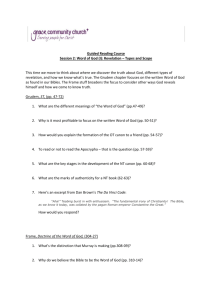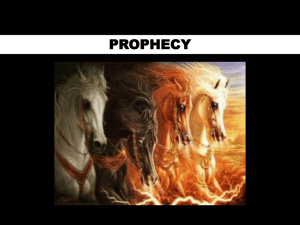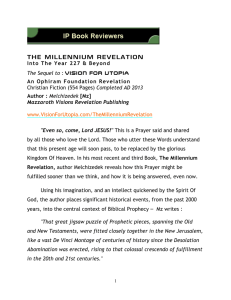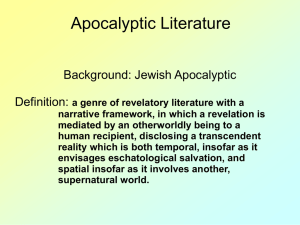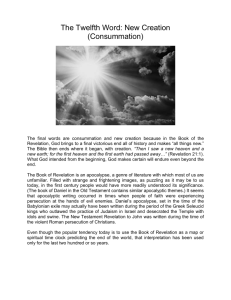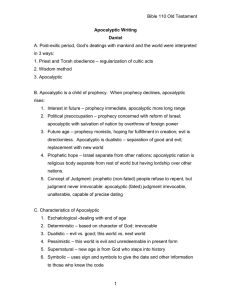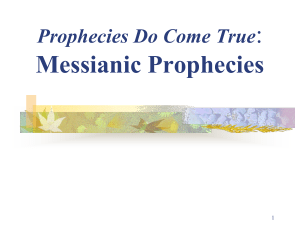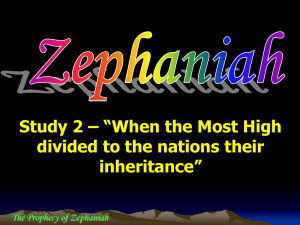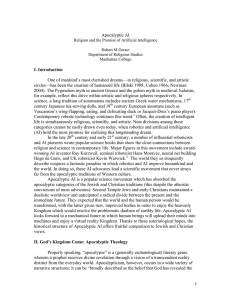Revelation has largely been fulfilled and has reference in particular
advertisement
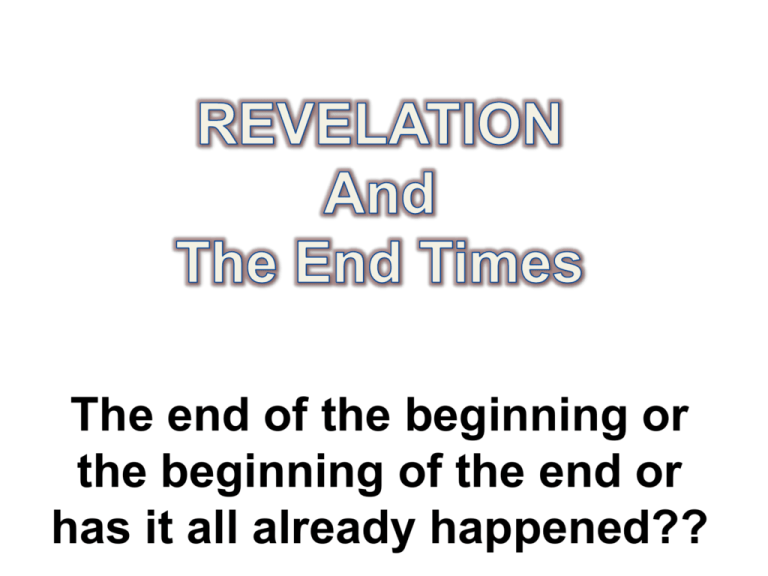
The end of the beginning or the beginning of the end or has it all already happened?? Systems of Interpretation for Revelation Preterist System – Revelation has largely been fulfilled and has reference in particular to John’s time and the Roman state Futurist System – the whole book following Chapter 4 takes place sometime in the future Prophecies about remote future events typically involve metaphors, similes, and hyperboles to make a point. A hyperbole is the use of an exaggeration as a figure of speech to create emphasis or for effect. An example of hyperbole is: "The bag weighed a ton." A Metaphor is the concept of understanding one thing in terms of another. A simile is a figure of speech that indirectly compares two different things by employing the words "like", "as", or "than”. For instance, a simile that compares a person with a bullet would go as follows: "Chris was a record-setting runner and as fast as a speeding bullet." A metaphor might read something like, "When Chris ran, he was a speeding bullet racing along the track.” In the OT, when prophets like Ezekiel, Daniel, and Zechariah thought about the distant future, they did not dwell on impending doom or Armageddon, but the redemption and restoration of God’s people and the return to Eden like conditions. They used figures of speech NOT intended to be taken literally. Taking these figures of speech literally does a disservice to the Bible. It also creates the problem of mistaking material that was fulfilled long ago in Israel or fulfilled in a more general way in Biblical times as material awaiting fulfillment as the Christian era nears an end. Read Revelation 13:5-8 Who or what is the beast? Preterist interpretations, a theological position also advocated by most academic scholars generally identify the First Beast with Nero. The Hebrews used letters for numbers. They had no zero. The Greek "Neron Kaisar” when transliterated into the Hebrew Nrwn Qsr had a number of 666. Resh ( )רSamech ( )סQof ( )קNoon ( )נVav ()ו 200 60 100 50 6 Resh ( )רNoon ( )נTOTAL 200 50 666 What is an apocalypse? Apocalypse comes from the Greek word meaning lifting the veil or revelation and is a disclosure of something hidden from the majority of mankind in an era dominated by falsehood and misconception, Apocalyptic literature can be treated as a hard and fast prescription of the future all the way to being completely imagination. One form is a literature written in a coded language to comfort a group of believers undergoing some kind of crisis. It begins with the present circumstances of the people and tries to help them interpret and endure those experiences in light of the larger perspective that John’s visions of what is above and beyond them. Apocalyptic literature may or may not relate to the end times. It usually deals with visions which may be hyperbolic or metaphorical in nature. The heart of this literature is the “unveiling” of secrets and truths about God’s perspective on difficult subjects like justice, evil, etc. and what God proposes to do about them. Apocalyptic literature was the dominant form of prophecy from the 2nd century BC through the second century AD. The authors believed that they were in an age where earlier prophecies were being fulfilled and were thinking about what God’s final solution would be. In the first century, God’s people were living in dark times and God’s will for believers was unclear. God’s will was a secret or a mystery, His plan needed to be revealed because it was not self evident. Have you ever been in a situation, like the 1st century Christians, where times were bad and God’s will was not self evident? What happened? There was a major shift from traditional prophecy where prophets spoke for God about the present or the future to apocalyptical prophecy which spoke about the end times. This shift took place because people believed that they were at the beginning or already in the end times. They wanted to know God’s will or plan. How is this that like we feel today? The prophecies for Jews and Christians many centuries ago had meaning for those people. They were written for those audiences, not for us. What the words meant in then, they still mean today. What they did NOT mean then, they do not mean today. The words were not written to scare us! The authors believed that their audiences already lived in the end times? How do you explain that the end times were over 2000 years ago? John had visions and wrote them down in what we know as the Book of Revelation as an apocalyptic prophecy to express not only what he had seen, but what bearing the vision meant to his audiences. John was not well versed in the scripture but also acquainted with the mythical images of the Greco-Roman world. What John saw he had to describe. When you see images and symbols in odd combinations, you have to find some sort of analogies to make sense out of them and describe them. Often times, metaphors are used and the symbols may have multiple meanings. How are it is for you describe something you have seen in a dream? Apocalyptic prophecy is a sort of coded language and requires interpretation and explanation. John is not only concerned about heaven but also about events that are near in terms of time. Read Revelation 12:1-6 Explain these verses in today’s context. Explain these verses in the context of the first century. John believed in God, Christ, and angels and their interaction with human beings. How do you view the interaction of angels in the world today and how would you describe it to others? Listen to Hallelujah Square How does this song relate to apocalyptical prophecy? How would words like these make you feel better when going through trying times?
